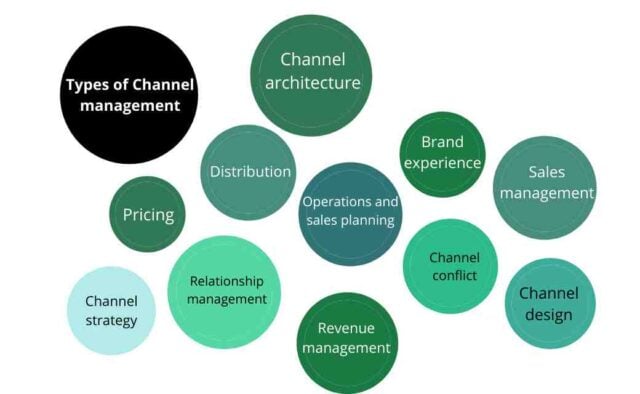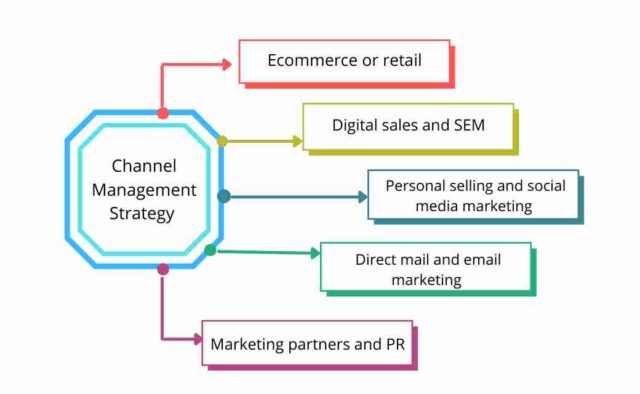What is channel management?
Channel management definition depicts the sales and marketing strategies a company uses to satisfy its customers, techniques used to support the partner helping the distribution process and ways to manage vendors. While building the solutions for channel management definition, the goals for each channel must be set.
Channel describes the way a company facilitates to sell their goods and services to the target audience. Adding to clear goals, the channel management definition requires:
- Identifying the products offered that are suitable for a particular channel
- Defining the procedures and policies to manage the company’s channels
- Developing the marketing and sales programs for each channel. To know the actual needs of the customers and not what the company thinks are.
Therefore, the channel management definition explains the technique of selecting the most efficient and best channel partners. To structure different routes ensuring the availability of the products in the market. The buying patterns and the requirements of the customers must be considered to establish separate channels for distribution.

For instance, if products are sold for adults, then both offline and online channels can be targeted for grocery products. The well-established physical stores turn out as most effective for selling the products as compared to online channels.
As a result, the business should identify, analyse and determine the best channel suited. According to the output expected from each distribution channel. Along with this, it determines the segment of the population connected with each channel management definition. Once all the related information is available, then the right investment can be made in the right channel to attain maximum sales or profits.
Types of Channel management meaning
The major types of channel management definition include the following:

Channel strategy
The channel strategy includes distribution and sales blueprints, like ways to expand the market and the specific action plans that a company will put in place to improve e-commerce customer relationship management.
Channel architecture
This concept describes the basic framework of the organisation’s channel. It determines how the product will be facilitated from the producer to the customer.
Sales management
This step involves managing the sales and other partners. Sales management may also include things like the incentives offered to drive sales.
Channel design
Channel design includes the concern for implementing new channels. A company may affiliate programs to encourage certain types of companies and people to promote or sell their products.
Channel conflict
Planning to address the conflicts between the channels that are counterproductive or unfair to one party. For example, if using e-commerce undercuts the affiliates, then the conflict must be addressed. While designing channels, attention must be paid so that no one channel is affected to create a conflict for another.
Brand experience
Developing a consistent brand experience across the channels including online selling through social media along with physical locations like stores or boutiques etc. For example, certain beauty brands make their customers feel pampered. However, in-person, this becomes easy, while the online experience must go with the same experience offering exclusive deals etc.
Relationship management
Relationship management determines managing and establishing relations with the affiliates, vendors etc over time.
Pricing
It states using channel-based strategies for pricing. Like luxury bakery that sells specific products to upscale areas only counts. As a situation of pricing under channel management definition.
Revenue management
Optimizing revenue for available inventory. For instance, a retail store can sell full-price swimsuits till the end of summer. At the time he may discount the inventory to make room for winter products.
Operations and sales planning
This method includes matching the goods and services produced with the actual demand. In a situation, if the company has a product popular at a certain time of year. Then they may increase the production in that particular season.
Distribution
This step focuses on the balance of obligations to both customers and channel partners. It includes managing logistics such as returns and product exchanges.
Problems of channel management
Facing difficulties in any kind of management becomes a common part. For this, it is necessary to find solutions to attain maximum returns on investment from that specific channel. This segment explains the probable challenges a channel management definition might face:
- Lower enthusiasm at the end of the intermediary
- Lack of communication between distributors and manufacturers
- Conflict arises when a distributor sells the product of competitors (that might happen due to excessive competition)
- Delay in supply chain management and shipment
- Due to the presence of multiple channels, decreased sales by a distributor for instance sales of the company are divided when the producer goes for an online channel.
- Not enough advertising and marketing
Process of channel management
For a business to be successful, it largely depends on intermediaries like wholesalers, retailers, agents etc. That represents the company’s product in the market. The channel management definition needs to develop a healthy relationship with these middlemen. To fulfil this, they are required to provide both non-financial and financial benefits to continue the active promotion of the manufacturer’s product.

Furthermore, there are 6 steps to explain the process of channel management definition which can be understood from the following:
Identification of sources
Firstly, for the process of channel management definition is the identification of sources or references. Being a new person in the market, the company needs to carry on the research work to identify sources using different methods like the trade associations can be approached, enquire in the market.
To find the reputation of distributors or customers and take part in trade exhibitions. While a well-established producer is approached by different intermediaries themselves. So it becomes necessary to do a proper background check of the middlemen before signing contracts with them.
The points a manufacturer must check on are the reviews of the customers. About the intermediaries or distributors, their enthusiasm to sell and their sales force.
Preparing a selection criteria
The next count can be the preparation of selection criteria which becomes essential for effective channel management definition. Further, there are various factors that a producer must consider before choosing channel intermediaries having different qualities.
Factors can be knowledge of the product and market, competitiveness, understanding of customers, reputation of intermediaries, managerial competence, market coverage etc. For instance, a distributor might hold a good reputation but sell products of various competitors with less enthusiasm about his ways of selling.
On the other side, a small distributor with less salesforce and popularism. But can be more enthusiastic with his approach to selling. Therefore, in such a situation, a manufacturer will probably choose the second distributor.
Selection of intermediaries
Making the right choice of distributors is essential for the growth of the business. There are various middlemen available in different sizes in the market. The new and small-scale intermediaries can turn inexperienced but might sell products with enthusiasm and better selling skills or resources.
Furthermore, they will sell the company’s products with fewer incentives and at a lower margin. On the other hand, the organisation has to give higher incentives to large-scale and well-established distributors to distribute their products in the market.
All the company has to do, is find the right intermediary for the business. Based on their future goals and requirements of the business. Since the channel management definition partners can be beneficial in realizing future goals.
Providing appropriate training to the middlemen
Once the channel management definition partners are selected. The next step arises to train the intermediaries according to the goals and requirements to sell the products effectively and efficiently. Training can provide essential information about the products and organisation to the middlemen.
So the channel partners can use the provided information in the right direction. The essential areas must be covered like marketing, personnel management, financial management, sales and stock control. The small distributors will appreciate the training part since they do not hold established processes to manage the areas.
Motivating them whenever needed
The forward step accounts for driving the channel partners in the process of channel management definition motivation can prevail in both non-financial and financial forms. Few distributors feel motivated if the company provides with increased margin on the sales of products.
While others might like to have territorial rights in some geographical areas. Moreover, this can be followed by verbal appreciation, providing them with updated products, and recognizing their efforts. Keeping personal contact with them and solutions to their problems. Ignoring this step might hamper the performance of the channel partners.
Assessment of intermediaries
Lastly for the process of channel management definition, we have an assessment of the performance of all intermediaries. The result of the evaluation procedure helps to find out which channel partner to retain and whom to drop.
There can be various criteria based on which the channel partners can be assessed like customer’s response, sales skills competencies, quality of service provided to customers, the position of display in-store, the quantity of stock purchased etc. Now, once the information is collected, one can continue the business with the right kind of channel management meaning partner.
Channel management strategy
Channel management definition in a marketing plan serves a variety of functions. One of the channels finds new ways to sell to the preferred customers. And second, after choosing the right channel, (like social media) the company can create experiences for their target audience to build brand loyalty and reputation.
Channel strategy initiates a brand to consider factors like consumer habits, competitive brand environment and more. The point to be remembered is that not all channels can be relevant to every brand or business.
Since companies have a certain amount of sources they can use so it becomes necessary to find the right channel for appropriate results. Some common strategies for channel management definition can include:

E-commerce or retail
One of the oldest or traditional methods of marketing channel strategy is retail. That includes opening a local physical location where customers can visit or operate online. By which customers can purchase goods and services.
However, many modern companies now combine the two i.e. retail operations and eCommerce pursuing a two-factor approach. For example, retail stores can offer customer services for online orders whereas eCommerce provides additional support for location stores.
Digital sales and SEM
The companies aim at direct selling to customers or other brands. The SEO and SEM strategies have become common components of the channel management strategy. The term SEM or search engine marketing is referred to as pay-per-click advertising and search engine optimisation which intends to provide attention to the company.
The concepts focus on getting the brand in the limelight of the customers using social media or digital platforms rather than communicating directly with partners or customers.
Personal selling and social media marketing
The search engine campaigns might be designed to suit the company’s specific preferences and language of the target audience. But do not turn out as personal as some other available channel strategy options.
Social media marketing is one of those options that companies are adapting to suit their customers with the marketing strategy, they want to form better connections with brands. Via these social campaigns or personal selling, organisations can promote and engage with customers at the same time.
Direct mail and email marketing
This strategy focuses on taking the right information to the customers rather than waiting for them. To find the content posted online or in-person store advertisements. Direct mail marketing or email marketing acts as a standard part of channel management strategy designs.
The terms are much more than sending messages to the prospects. Mail-based marketing is more like nurturing the target audience and maintaining custom relationships through ongoing valuable interactions. The campaigns take place over the period to build trust and awareness.
Marketing partners and PR
To create brand awareness, when the company is new to the industry or wants to focus on a niche market. One of the best ways is a channel management strategy is to work with partners. Ambassadors, marketing affiliates and PR partners drive attention to the company through media coverage via a range of outlets. The more right environment partners the faster company can reach customers.
Note: Omni-channel strategy is similar to multi-channel marketing, but takes the concept of cross-platform interactions to the next level. Rather than giving the customers to choose from various avenues. The strategic focus is to provide a consistent experience wherever the company speaks to the audience. Since audiences switch to devices, it makes sense to complete their buying task wherever they are. For example, Disney
Conclusion
Channel management definition concludes the various methods or channel partners opted by an organisation to reach the target audience. There can be various common strategies like direct marketing, personal selling or SEO.
That can be selected by a business according to its goals and requirements. Moreover, the process of establishing efficient channel management meaning is also discussed for better understanding.
Frequently Asked Questions (FAQs)
What is channel management in simple terms?
Channel management depicts the sales and marketing strategies a company uses to satisfy its customers, techniques used to support the partner helping the distribution process and ways to manage vendors.
What are examples of channel management?
For example, you may sell on your website, via social selling, and in your brick-and-mortar store. You may even sell larger products through a network of manufacturer’s reps while selling replacement parts and accessories directly to end users online.
What is the channel management role?
Channel managers are responsible for creating and sustaining new sales and contrasting ends by establishing and keeping a good working rapport with resellers and various departments and dealing with channel programs.